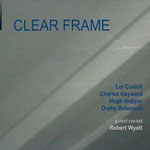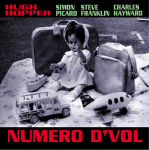Home » Jazz Articles » Interview » Hugh Hopper: Idiom As A Means To No End
Hugh Hopper: Idiom As A Means To No End
 Hugh Hopper started out on his path through music as a stalwart of the British Canterbury scene, from which came bands including Soft Machine, of which Hopper was a member for five years, Caravan and Hatfield and The North. In a sense he's embodied the music which emerged from that scene, which might be best described as an idiosyncratic take on jazz-rock fusion. Any pigeonholing this might imply does him an injustice however, as it takes no account of his interest in the use of tapes, looping and the mechanical manipulation of sound for musical ends.
Hugh Hopper started out on his path through music as a stalwart of the British Canterbury scene, from which came bands including Soft Machine, of which Hopper was a member for five years, Caravan and Hatfield and The North. In a sense he's embodied the music which emerged from that scene, which might be best described as an idiosyncratic take on jazz-rock fusion. Any pigeonholing this might imply does him an injustice however, as it takes no account of his interest in the use of tapes, looping and the mechanical manipulation of sound for musical ends.
As a bass guitarist it could be argued that he has consciously shied away from the ever increasingly virtuosic model in favor of a far more integrated group role that serves greater musical ends.
Chapter Index
All About Jazz: Was there something in the Canterbury water that ensured a diversity of creative musicians emerged from the place within a few years of each other, or was it down to something as simple as young people getting exposed to a wide range of music on record?
Hugh Hopper: Well, in fact, not many musicians actually came from Canterbury—just the Sinclair cousins, Richard Coughlan, my brother Brian, Mike Ratledge, Robert Wyatt, Pye Hastings and Kevin Ayers (and the last three were not born there).
The Canterbury label was invented and applied by journalists several years after we had all moved away from Canterbury. In fact, the town was so lacking in opportunities for music that we couldn't wait to leave and live in London.
AAJ: You were a key member of some of the most significant and musically rewarding line-ups of Soft Machine. Was that band at any point, during your time with them, governed by what might be called an underlying collective ethos, or was it more a matter of musicians cherishing their own ideas of the direction they wanted the band to take?
 HH: Both, I would say. We all certainly had our own agendas (which is why the band was always in process of exploding), but they came together at certain points, mostly in a desire not to play the usual stuff that everyone else was doing, and that refers also to the sound of the band—using organ rather than the ubiquitous guitar, not playing blues, writing our own material.
HH: Both, I would say. We all certainly had our own agendas (which is why the band was always in process of exploding), but they came together at certain points, mostly in a desire not to play the usual stuff that everyone else was doing, and that refers also to the sound of the band—using organ rather than the ubiquitous guitar, not playing blues, writing our own material.
AAJ: There certainly seemed to be a creative tension between yourself, keyboardist Mike Ratledge and drummer Robert Wyatt, to the extent that the music you produced seemed greater than the sum of the parts. Would you say that was so and if so how do you think it came about?
HH: Yes. Three very different characters and each with his own concept of music and life.
AAJ: We're currently blessed with a glut of live material from the band at that time and if that's taken as evidence it seems like the same set was never played the same way twice. How conscious were you as an individual and the band collectively of how far you'd strayed from the three-minute pop song in ways other than sheer duration?
HH: As I said, one of the most important things for us was not to play like other people. And yes, we were always changing the music around—adding and subtracting sections.
class="f-right">
AAJ: Recorded evidence suggests you've always had a very personal conception of group identity. Would you say a formula made up of that and empathetic musicians is a recipe for musical success, or do you consider the situation to be far more fluid and subject to the moment?
HH: It does depend somewhat on what kind of music you are playing. If it's mostly improvised then it's essential that there is some natural chemistry between the players. If the music is highly composed and arranged then it's not quite so important, although for personal pleasure it's always better if there is that magic between the musicians.
AAJ: In the past you've intimated that the death of quirks and strangeness within Soft Machine's music contributed to you leaving the band. Would you say that those qualities are so inherently intriguing that they've been a major part of your musical approach?
HH: Yes. There is enough immaculate but boring music in the world.
 AAJ: What's your attitude towards instrumental virtuosity as such? Do you think it's a key factor in determining whether or not a band ends up playing for itself as opposed to any outside audience?
AAJ: What's your attitude towards instrumental virtuosity as such? Do you think it's a key factor in determining whether or not a band ends up playing for itself as opposed to any outside audience?
HH: Good point. I am not a virtuoso myself, so I have learned to use what I do have available in a meaningful way. Some of the musicians I play with are monster technicians, like the French guitarist Patrice Meyer, and he never fails to send chills up my spine, but I wouldn't be interested in playing with someone just because he can play a million notes per second.
AAJ: It's apparent from your past work with the likes of the late keyboardist Alan Gowen that you seem to latch on to specific qualities within musicians—Gowen's harmonic sense, drummer Dave Sheen's swing and the like. Do such qualities in your estimation serve greater musical ends than mere virtuosity?
HH: Yes, definitely.
AAJ: In terms of jazz-rock fusion, would you say that overall one has gained at the expense of the other with the passing of time, or has it become for you more a matter of bringing individual musical sensibilities to bear? It would certainly seem to be the case that in the decades since the notion was first aired there's been a shying away from its quirkier, less idiosyncratic implications.
HH: To be honest, I don't really think in terms of labels like prog or jazz-rock. I still occasionally hear a band that makes me smile, and it could be in or out of any of those labels.
AAJ: How influential was Daevid Allen in terms of your use of tape collage and the like? Would this be one of the musical elements that you find endlessly intriguing?
HH: Absolutely central to my music. I first worked with Daevid in London and Paris in 1963-64, after he had been working with Terry Riley and the French Radiophonic workshop. I was 17-18 and open to all those psychedelic influences. I still use some of that in recording. (And I am still playing live with Daevid in Brainville 3) HH: Firstly, it's harder these days to keep a band going financially, so we are all dependent on keeping our options open, not just playing in a single band. But also, since leaving Softs I have enjoyed much more the possibilities of playing in different projects. AAJ: What's your attitude towards the song format? In a sense it seems almost diametrically opposed to the majority of your music yet it still has its place. HH: I have written a lot of songs. I still work with singers occasionally. It's all part of my music—I like instrumental stuff and when the singer is special I like vocal songs also. AAJ: Finally, the Clear Frame release referred to in this interview's discography has all the hallmarks of creative renewal for every musician involved. Is there a chance this band will stay together and record again in the future? HH: No doubt. We play from time to time. Lol Coxhill is getting fairly fragile, so he doesn't tour much, but we did four gigs in Switzerland and Austria last year. Soft Machine, Alive In Paris (DVD) (Voiceprint, 2008) Photo Credit
class="f-right">
Selected Discography
Clear Frame, Clear Frame (Continuity, 2008)
Soft Machine Legacy, Steam (MoonJune, 2007)
Hugh Hopper, Numero D'Vol (MoonJune, 2007)
Soft Machine, Grides (CD/DVD (Cuneiform, 2006)
Soft Machine, Soft Machine & Heavy Friends: BBC In Concert 1971 (Hux, 2005)
Soft Machine, Live In Paris (Cuneiform, 2004)
Soft Machine, Backwards (Cuneiform, 2002)
Soft Machine, Noisette (Cuneiform, 2000)
Hughscore, Delta Flora (Cuneiform, 1999)
Soft Machine, Virtually (Cuneiform, 1998)
Soft Machine, BBC Radio 1967-71 (Hux, 1996)
Hugh Hopper Band, Meccano Pelorus (Wayside, 1991)
Hugh Hopper / Alan Gowen, Two Rainbows Daily (Cuneiform, 1980, reissued 1995)
Soft Head, Rogue Element (Ogun, 1978, reissued 1996)
Hugh Hopper, Hopper Tunity Box (Cuneiform, 1974, reissued 2007)
Hugh Hopper, 1984 (Cuneiform,1973, reissued 1998)
Soft Machine, Six (Sony, 1973)
Soft Machine, Fifth (Sony, 1972)
Soft Machine, Fourth (Sony, 1971)
Soft Machine, Third (Sony, 1970)
Soft Machine, Spaced (Cuneiform, 1969)
Scott Friedlander
< Previous
Outright!
Next >
The Masters Return!
Comments
Tags
For the Love of Jazz
 All About Jazz has been a pillar of jazz since 1995, championing it as an art form and, more importantly, supporting the musicians who create it. Our enduring commitment has made "AAJ" one of the most culturally important websites of its kind, read by hundreds of thousands of fans, musicians and industry figures every month.
All About Jazz has been a pillar of jazz since 1995, championing it as an art form and, more importantly, supporting the musicians who create it. Our enduring commitment has made "AAJ" one of the most culturally important websites of its kind, read by hundreds of thousands of fans, musicians and industry figures every month.






















